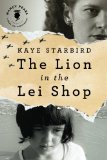Summary | Excerpt | Reviews | Beyond the Book | Readalikes | Genres & Themes | Author Bio

My big, black-haired father used to swoop me up in my orange life jacket and carry me into the breakers and afterward help me build castles in the sand, the kind with little moats around them to let the water in. I used to laugh a lot, partly because of the moats but mostly because I loved my father. My mother was always nearby, lying on a piece of straw matting with her hair tied back from her face and her dark glasses on and her bathing suit beginning to get tighter across her stomach because of the baby. She usually had her eyes closed as she lay there on her side, as relaxed and decorative as a sleeping kitten. Only she hardly ever was sleeping. We could tell because every now and then she sifted some sand through the small neat fingers of one hand or smiled at something my father said or reminded me to put my sunbonnet back on. There were men and women body-surfing and children throwing balls or digging tunnels and mothers pouring lemonade out of Thermoses and teenagers burying each other's legs and lovers strolling off toward the point looking for shells. They were all Army people, and I knew most of them by sight. Sometimes they stopped to speak or sit down to oversee the castle building or stretch out for a while beside us, gazing into the distance where the gulls wheeled and the waves rolled, and sometimes a young officer known as Sharkbait swam beyond the other swimmers out toward the far horizon line where the clouds were massed white and unmoving above the blue water. I was used to all of it and happy because of it, although I didn't know the meaning of the word then. The beach, the sea, and the untroubled sky, like my parents, had existed forever and would continue to exist until the end of time; and I took them for granted, as most children take love for granted, or their hands or eyes. I say that children take these things for granted. Actually, my mother took them for granted, too. She doesn't now, but she did then. She had grown up—I later learned—in an old and well-to-do Boston family, where life had been both pleasing and protected; and, though her marriage had changed the surface pattern of her world, it had done nothing to alter the basic structure.
My father was different. He once told me how he'd lived in a Chicago orphan asylum until he was sixteen, never knowing who or where his parents were; and when I asked him what an orphan asylum was, he explained about the bleak rooms and the tired people who cooked the food and mended the worn blankets and broke up the fights in the halls. There wasn't much to see there, he said, and there wasn't much to love. He went on to say maybe it was a good thing, though: it took a long night of darkness to appreciate a day of sun.
"You understand that, Marty?" he asked.
"No," I answered, "but I believe you, Father."
To my father, every day was like an undeserved gift, and he could watch a man laying bricks, a bird riding the air currents, a papaya tree growing faster than a tree should grow, or the water seeping into the sand-castle moats with a delight that almost amounted to awe. As young as I was, I sensed this, just as I sensed that he considered my mother and me the greatest gifts a man could have.
I keep trying to get away from the morning when everything changed. I'll get back to it. I was lying in bed watching the doves, and after a while I went to the dresser and took out a box of shells I kept in the bottom drawer. I carried them back to bed with me, along with a couple of green glass fishing floats that my father had found for me in a rocky cove one afternoon. I looked at the shells for a few minutes, then turned on the bed lamp and held one of the transparent floats up so the light could shine through. It was pretty, but I wished eight o'clock would come, so my parents would wake up and get breakfast, busying themselves with the waffle-cooking and letting me do things like pour the fruit juice or fill the brown pitcher with syrup. Sunday was the maid's day off, when Iyaga went home to visit her children and grandchildren on the pineapple plantation. I didn't miss her on Sunday because it was a special day, but the rest of the week I liked having her around. There was a serenity and agelessness about Iyaga that I found pleasing. She seldom talked, so I didn't know much of her history except that she had been born in Japan and hoped to go back there someday. I didn't want her to go, because she was part of the framework of my world like the wallpaper butterflies and the lei-shop women and the green-gray mountains that ringed the post and hid the sea.
Excerpted from The Lion in the Lei Shop by Kaye Starbird. Copyright © 2013 by Kaye Starbird. Excerpted by permission of Amazon Publishing. All rights reserved. No part of this excerpt may be reproduced or reprinted without permission in writing from the publisher.
Being slightly paranoid is like being slightly pregnant – it tends to get worse.
Click Here to find out who said this, as well as discovering other famous literary quotes!
Your guide toexceptional books
BookBrowse seeks out and recommends the best in contemporary fiction and nonfiction—books that not only engage and entertain but also deepen our understanding of ourselves and the world around us.